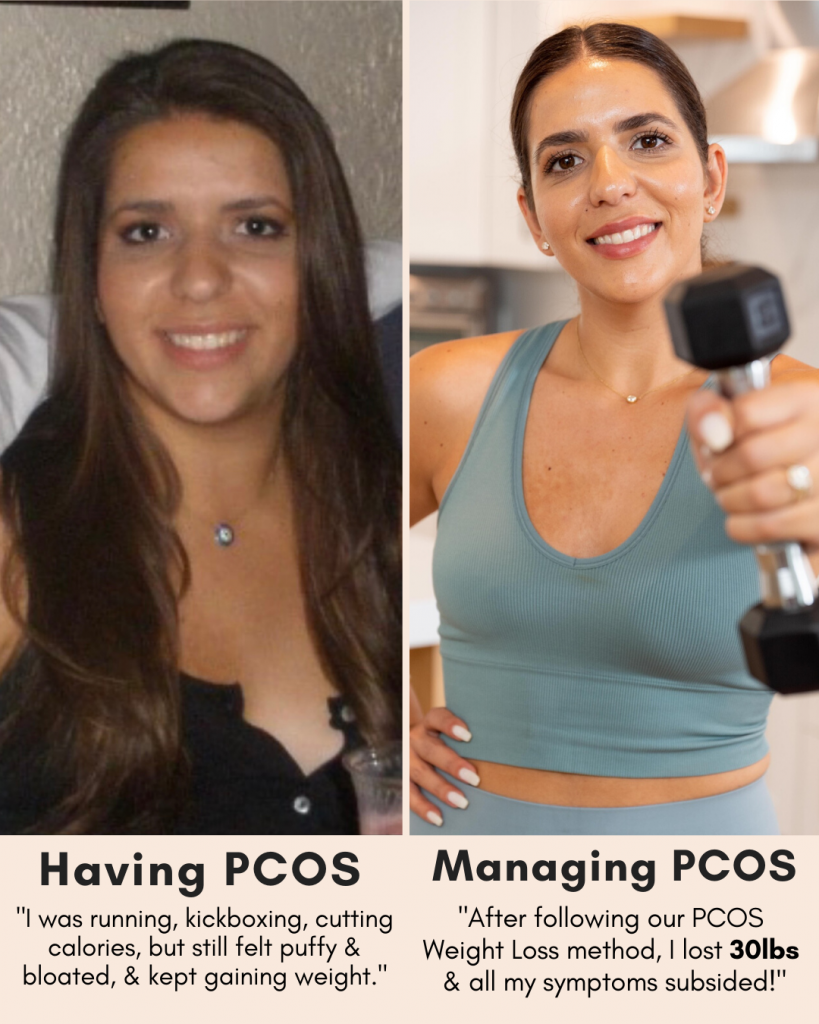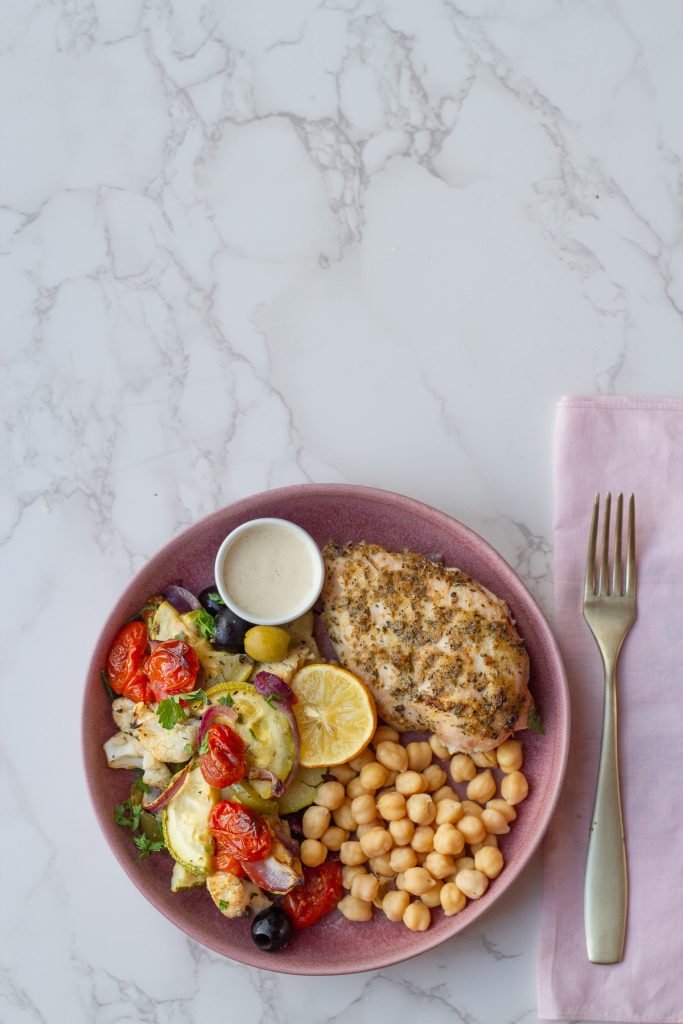

Polycystic Ovary Syndrome (PCOS) is a hormonal disorder common in women of reproductive age. The hormonal imbalances create excess testosterone, cortisol, and insulin, leading to symptoms including hair loss, facial hair, irregular periods, acne, and difficulty losing weight.
Weight gain and weight loss issues go hand in hand for women with PCOS. There are two big reasons for this: insulin resistance and inflammation. Low-grade chronic inflammation drives insulin resistance further, and both lead to weight gain, specifically in the midsection.
Insulin resistance occurs when the body’s cells—especially in the muscles, fat, and liver—don’t respond properly to insulin, the hormone responsible for regulating blood sugar levels. As a result, the body produces even more insulin to compensate, leading to elevated insulin levels.
For many women with PCOS, this excess insulin can trigger increased hunger and cravings (even after a full meal!) and encourage fat storage, particularly around the belly. If that wasn’t enough, these elevated insulin levels and high blood pressure can also put you at risk of developing type 2 diabetes and cardiovascular disease. These factors can make weight loss feel frustratingly difficult—but the good news is that insulin resistance can be managed with the right strategies!
Not all PCOS Cysters are overweight or obese, but sustainable weight loss can help those who are. However, “eat less and exercise” isn’t helpful advice for women struggling to lose weight with PCOS. Over-exercising and restrictive eating can destabilize blood sugar levels, which is a big no-no when trying to manage insulin resistance and lose weight.
Despite the difficulties accompanying Polycystic Ovarian Syndrome (PCOS), it’s possible to manage PCOS symptoms and lose weight naturally.
Here’s how!
How to Successfully Lose Weight with PCOS
Please note this blog post is not a substitute for official medical advice. If you are concerned about your PCOS symptoms, suspect you have an underlying health condition or wish to make dietary/lifestyle changes, please consult your doctor first.
1. Go gluten- & dairy-free.
Gluten and dairy are known inflammatory foods, and since PCOS is an inflammatory condition, going gluten and dairy-free can give you an edge in fighting that.
Science shows that both gluten and dairy can be addicting, which can contribute to having worsened cravings for them. Gluten has been shown to reduce leptin sensitivity by 50%! Leptin is the hormone that tells us that we’re “full” and when we have reduced leptin sensitivity, we feel hungry all the time!
2. Get your carbs right .
PCOS women are often told to cut out carbs completely because they spike our blood sugar, but that’s not a very sustainable approach.
You can have carbs, but how and what you eat makes a big difference in digestion. For example, if you’re having fish and salad, you could add a side of rice. The healthy fats from the fish and the fiber from the salad will help you slowly absorb the sugar from the rice into your bloodstream and prevent a huge spike in blood sugar.


To learn more about how many carbs are right for your body, I can help you discover your carb tolerance range in The Cysterhood.
3. Get plenty of fiber .
If you thought the only purpose of fiber was to keep your bowel movements regular, think again! As well as relieving constipation and filtering out excess hormones, fiber plays a key role in lowering cholesterol and keeping your blood sugar stable, making it easier to lose weight.
Fiber-rich foods not only provide volume but also take longer to digest, making you feel fuller and energized for longer and with fewer calories!


High-fiber foods include:
- Almonds
- Oats
- Quinoa
- Chickpeas
- Lentils
- Broccoli
- Carrots
- Bananas
- Avocado
4. Eat enough protein and healthy fats .
Protein helps to stabilize blood sugar levels and keep insulin down by blunting the absorption of carbohydrates/sugars. Specifically having a high-protein breakfast can set you up for having blood sugar stability for the rest of the day. I like to aim for 30g in the morning!
Adding protein to most of your meals is a nutritious and filling way to aid sustainable weight loss.
High-protein foods include:
- Fish, such as salmon or mackerel
- Poultry, such as chicken or turkey
- Beans
- Lentils
- Nuts and seeds
Healthy fats like avocado, nuts, flaxseeds and olive oil are also great additions to a PCOS-friendly diet as they can help to reduce inflammation.
5. Eat 3-4 times per day.


How often do you reach for the snacks out of boredom at random times of the day?
Every time we eat, our insulin levels rise—that’s completely normal! But when we snack or graze throughout the day, insulin stays elevated. When insulin remains high for too long, it can interfere with fat burning, making it harder to lose weight.
As a registered dietitian with PCOS, I suggest having 3 balanced meals (breakfast, lunch and dinner) along with one snack in between lunch and dinner. You’re less likely to have cravings throughout the day when your meals are balanced and you’re prepared for your afternoon snack.
6. Limit sugary and processed foods .
Processed foods often contain added sugars, unhealthy fats, excess salt, and artificial additives like flavor enhancers or thickeners. And while there’s nothing wrong with enjoying a treat now and then, consistently eating a diet high in processed and sugary foods can contribute to weight gain, hormonal dysregulation, and other health issues.
Prepare for your afternoon snack by swapping the processed, sugary snacks with food pairs that can help with blood sugar, for example, a carb paired with protein or a healthy fat. I’ve got plenty of low-sugar snack recipes that you can check out in The Cysterhood.
7. Exercise regularly .
Regular physical activity is shown to improve the metabolic and reproductive symptoms associated with PCOS. It’s proven to help improve glucose metabolism and regulate your insulin levels, which is great for PCOS weight loss.
Along with a nutritious diet, a combination of doing slow, weighted workouts can help improve insulin sensitivity. Lifting weights helps you build muscle, which helps keep your metabolism moving even after your workout.
What’s more, slow, weighted workouts can reduce the stress hormone cortisol. Having high levels of cortisol for a prolonged period can increase insulin. This is why we strongly advise PCOS cysters to try doing slow, weighted workouts. Shoot for 30 minutes a day for big improvements in your weight and symptoms!


8. Fill nutrient gaps with PCOS-friendly supplements.
No matter how balanced and intentional your diet is, nutrient gaps are inevitable. There are just a lot of daily vitamins and minerals that support our body’s essential functions! A gluten- and dairy-free diet combined with strategic supplements can not only help with weight loss, but they can also relieve other symptoms of PCOS, including acne, menstrual irregularity, mood issues, fatigue, and more.
I recommend taking NSF-certified supplements specifically formulated for PCOS to give yourself the best chance of success! You can find just that at Ovafit. Here are the supplements I recommend:
9. Get quality sleep.
Last but certainly not least, the importance of rest cannot be overstated! Sleep deprivation, even after one night, exacerbates insulin resistance. Numerous studies have examined the link between sleep and weight. Lack of energy and sleepiness typically leads to a higher sugar and caffeine intake, leading to weight gain and less exercise.
You should aim for 8-9 hours of sleep a night to reduce stress, maintain a healthy weight, boost your immune system and lower your risk of serious health problems, like diabetes and heart disease.
Losing weight when you have PCOS can be challenging, as many women struggle with sleep disturbances. However, some of the habits you establish during the day, like keeping cortisol low with slow, weighted workouts or maintaining a PCOS friendly diet so you’re not on a blood sugar rollercoaster, can help you get better quality sleep throughout the night.
10. Build a support squad.
Losing weight can be tough, and navigating the symptoms of PCOS can make it even tougher. That’s why it’s so important to surround yourself with a supportive community that understands what you’re going through. Consider joining a PCOS support group or finding a friend who is also looking to improve their health. Having someone to talk to and rely on can make all the difference. In The Cysterhood app, everyone is invited to join my private Cysterhood group where Cysters get to share their wins, their setbacks, and their PCOS journey while cheering and supporting each other. It’s also a great place to learn from each other’s experiences and get your questions answered by me!
11. Talk to a healthcare professional.
PCOS is often accompanied by insulin resistance and weight gain, making it all the more challenging to shed the pounds. Speaking to a healthcare professional who specializes in PCOS can provide you with personalized advice on diet, exercise, and medication that could be beneficial for people with PCOS. They can also assess your cortisol levels to ensure that your weight loss plan takes your unique needs into account. Additionally, discussing sleep apnea and other health conditions can assist long-term goals. Start your journey with guidance and support from healthcare professionals who know how to manage PCOS.
With the right approach, you can create a diet and lifestyle that makes you feel fantastic from the inside out.
When you’re trying to lose weight with PCOS, it’s about so much more than just what we see in the mirror. Even just a little weight loss can improve SO many difficult, chronic symptoms. This is why I am so passionate about helping Cysters like you take control and reverse PCOS through natural lifestyle changes! For more tips on PCOS diet dos and don’ts, check out our podcast, A Cyster and Mister and our handy blog posts on PCOS Weight Lost.org.